Diary of a world premiere: Join playwright Rajiv Joseph as the curtain rises on his ‘Archduke’
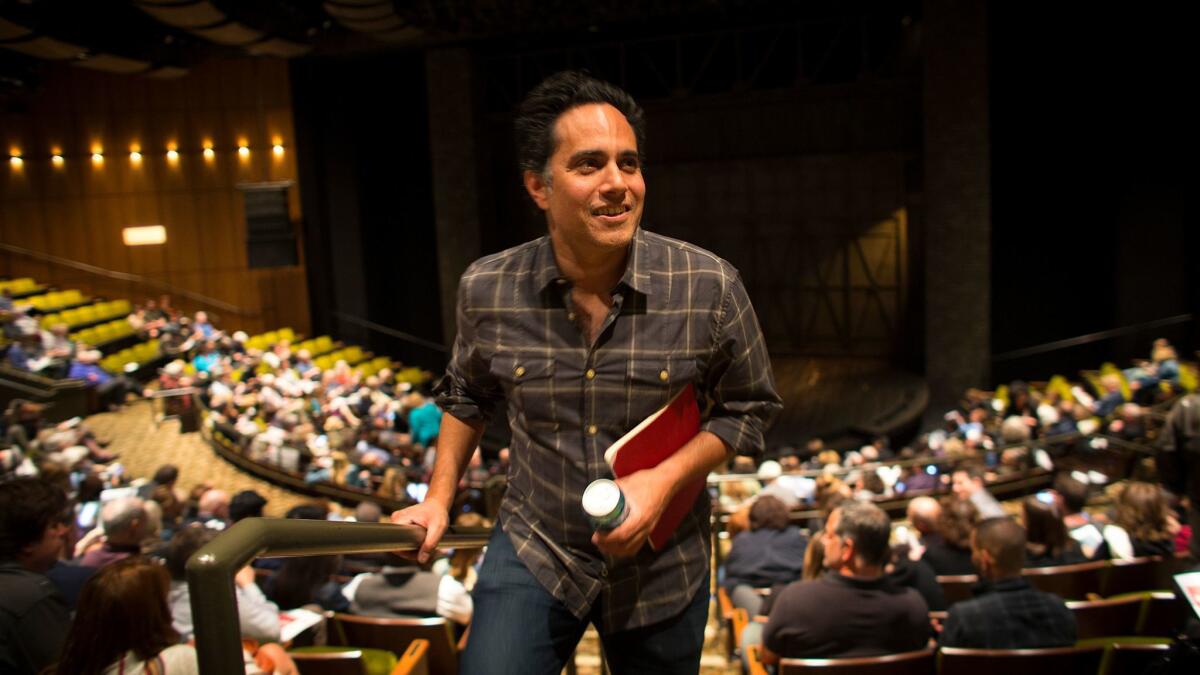
When his play “Bengal Tiger at the Baghdad Zoo” was playing at the Mark Taper Forum in 2010, Rajiv Joseph was invited to the office of Center Theatre Group’s artistic director, Michael Ritchie. “We talked about football for a while,” Joseph recalls. “Then Michael said, ‘We’d like to commission you to write a play for us.’ I said, ‘OK.’ Then we talked about basketball for a while.”
Just your typical meeting, where world-premiere plays are bought and sold between discussions of zone defenses and shot clocks.
Now, seven years later, the fruit of that commission — Joseph’s new play, “Archduke,” a dark comedy set in Eastern Europe at the start of World War I — is set for its opening night at the Taper on Sunday. Anticipation is high; after all, “Bengal Tiger” went to Broadway after its Taper run and was a finalist for the Pulitzer Prize.
Joseph agreed to let the L.A. Times shadow him for the first preview performance of “Archduke” so readers could follow this milestone in the life of a new production. During the preview period — about two weeks for this show — everything can be fluid. The playwright may rework lines and scenes, so much so that actors have to carry the new pages onstage. The designers are still adjusting the set, lights, sound and costumes. “So it’s weird, because the first preview isn’t opening night,” Joseph says. “But in some ways, it really is opening night, because it will be the first time we do it in front of an audience.”
Here’s our diary of the evening.

5:30 p.m.
Something to eat? A drink would be better
Center Theatre Group, which traditionally provides dinner for the cast and crew before the first preview, has laid out pizzas and salads in the rehearsal room, and the “Archduke” team is due after rehearsal. Theater staffers worry they’ve over-ordered. “We’re still in ‘Zoot Suit’ mode,” one says — a much bigger production earlier in the season, with more mouths to feed. Joseph and a few actors trickle in. Others have stayed away, somebody jokes, because they’re playing tuberculosis patients and eating sparingly.
Joseph has dinner plans at 6, so he doesn’t eat. A few people stand around, watching Joseph and his shadow reporter, waiting for journalism to occur. What would Joseph do if there weren’t a reporter on the scene? “Probably get a drink at Kendall’s,” he says.
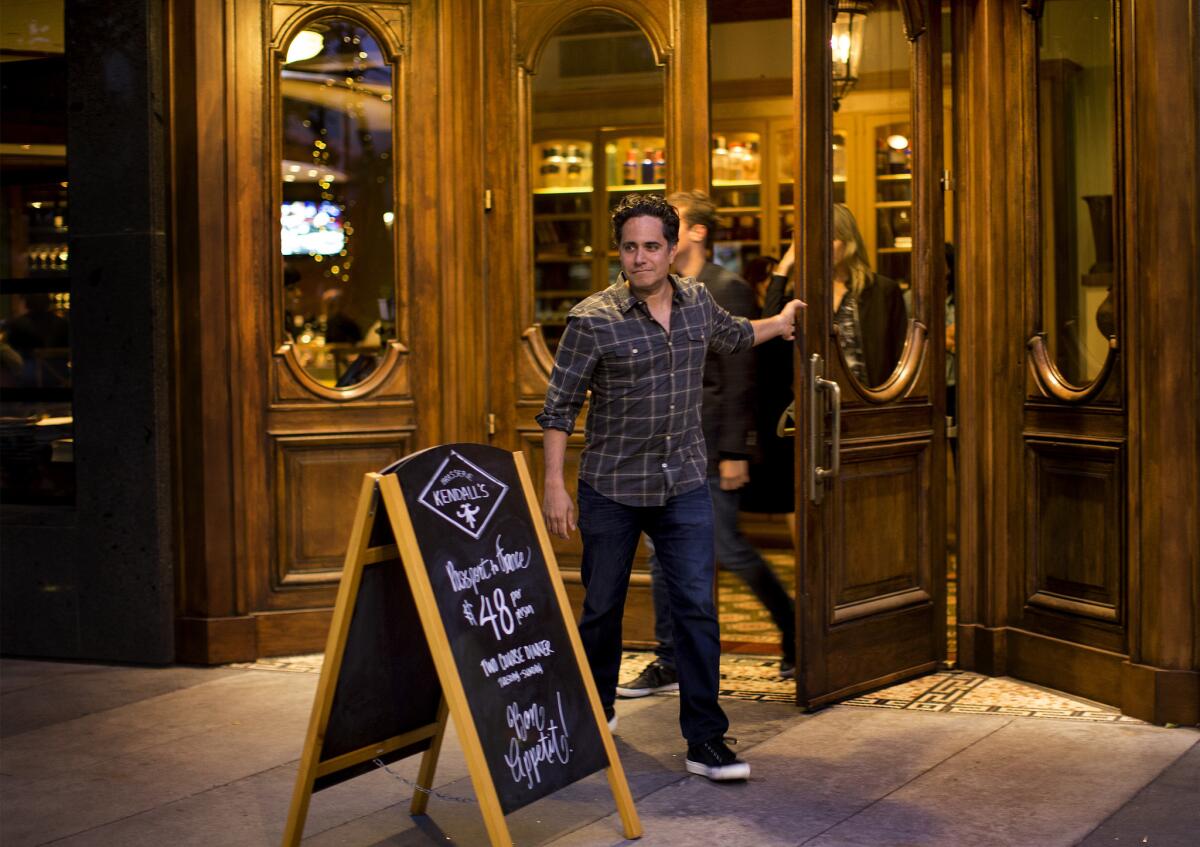
5:45 p.m.
‘I’m going to be following the audience tonight’
Joseph walks down Grand Avenue to Kendall’s and orders a gin martini. He’s 42, a handsome guy who reflects his heritage (Indian father, European mother): dark hair, green-gold eyes. He has a warm smile and exudes restrained elation. “Of all the things I do as a writer,” he says, “my favorite is being right here, where I am now.” He’s not talking about Kendall’s, though it is a lovely spot. He’s talking about seeing one of his plays come to life.
If he were nervous about anything, he allows, it would be the first scene of “Archduke.” He rewrote it earlier in the day. The actors didn’t have much of a chance to run through the new lines.
“Once we get through that — and I know we will — I’ll be able to relax,” he says. But not entirely. He’ll be paying close attention to the audience, noting when people laugh — and when they lose interest and leaf through their programs.
“Archduke,” Joseph says, started out as an entirely different play, about two composers in Serbia in the early 1900s. He workshopped early scenes at the Lark Play Development Center in New York and wasn’t thrilled with them. He’d given one of his characters a brother who was real historical figure, Gavrilo Princip, the Bosnian Serb who assassinated Archduke Franz Ferdinand of the Austro-Hungarian Empire in 1914. When Joseph described what he’d discovered in his research — the improbable series of events by which a young consumptive triggered World War I — his Lark colleagues all leaned forward in their chairs.
“It was way more interesting to them than the pages I’d written,” Joseph recalls. “I realized that there was my play. You have to follow the audience. I’m going to be following the audience tonight.”
6 p.m.
‘Pay attention, John!’
Joseph’s dinner guests, Dana Stevens and her son, John Apted, arrive. Joseph met Stevens last fall when they were both teaching at a writers conference in Nantucket. She’s a screenwriter; her former husband is the filmmaker Michael Apted, and their son, a junior in high school, is considering a career in playwriting.
Over a lavish French meal — escargots, paté, steak frites, cassoulet — and another round of martinis, Stevens quizzes Joseph about his education, playfully interjecting, “Pay attention, John!” A self-possessed and thoughtful young man, Apted doesn’t require these injunctions. He’s just finished writing a one-act play, he says. Joseph listens encouragingly to a plot recap, then says, “Dude, that’s amazing. I like the way your mind works.”
Joseph makes a suggestion: “If you’re stuck, maybe think about what happens in the next scene. My play ‘Bengal Tiger’ started out as just one scene. I had that one scene for about four years, and then I started to think about what could happen next. Maybe bring in another character. Maybe this is a world where there are ghosts.”
Stevens later mentions that another of Apted’s career interests is sports management. “You like sports?” Joseph asks.
“You like sports?” Apted counters.
“The movie ‘Draft Day,’ I wrote that with my buddy, Scott [Rothman]. That’s our movie,” Joseph says.

7:35 p.m.
Almost showtime
Joseph checks his watch. Is he going to be late to his own play? He relaxes when he notices his director, Giovanna Sardelli, at the bar with lighting designer Lap Chi Chu, costume designer Denitsa Bliznakova and sound designer Daniel Kluger.
“We’re going to leave in five minutes,” says Sardelli, coming over to be introduced. She and Joseph are close friends. She has directed several of his plays, and in preparing for “Archduke,” they traveled together to Belgrade, Serbia, and Sarajevo, Bosnia-Herzegovina. She jokingly warns the reporter that watching a preview next to either of them can be dangerous. “One time, I almost clawed the skin of his leg off,” she says.
7:45 p.m.
Selfies, high-fives and quiet encouragement
Joseph and his guests walk up the steps to the Music Center Plaza. Outside the Taper, they snap selfies in front of the “Archduke” poster.
Stevens and Apted go in to take their seats. Joseph hovers at the door for a few more minutes, welcoming friends. He’s hoping to see a former writing teacher who has flown out for the show, but when the lights start flashing, he decides to wait till intermission. He rushes backstage to grab his notebook before heading back into the house.
Joseph takes the stairs two at a time and finds his creative team settling into the back two rows, just below the control booth. “First preview, everybody!” he says, exchanging high-fives and hugs before sitting down in an aisle seat in front of Sardelli. He immediately bounces up again to greet Ritchie, who murmurs sotto voce encouragement — or possibly point spreads? — into his ear and claps him on the shoulder.
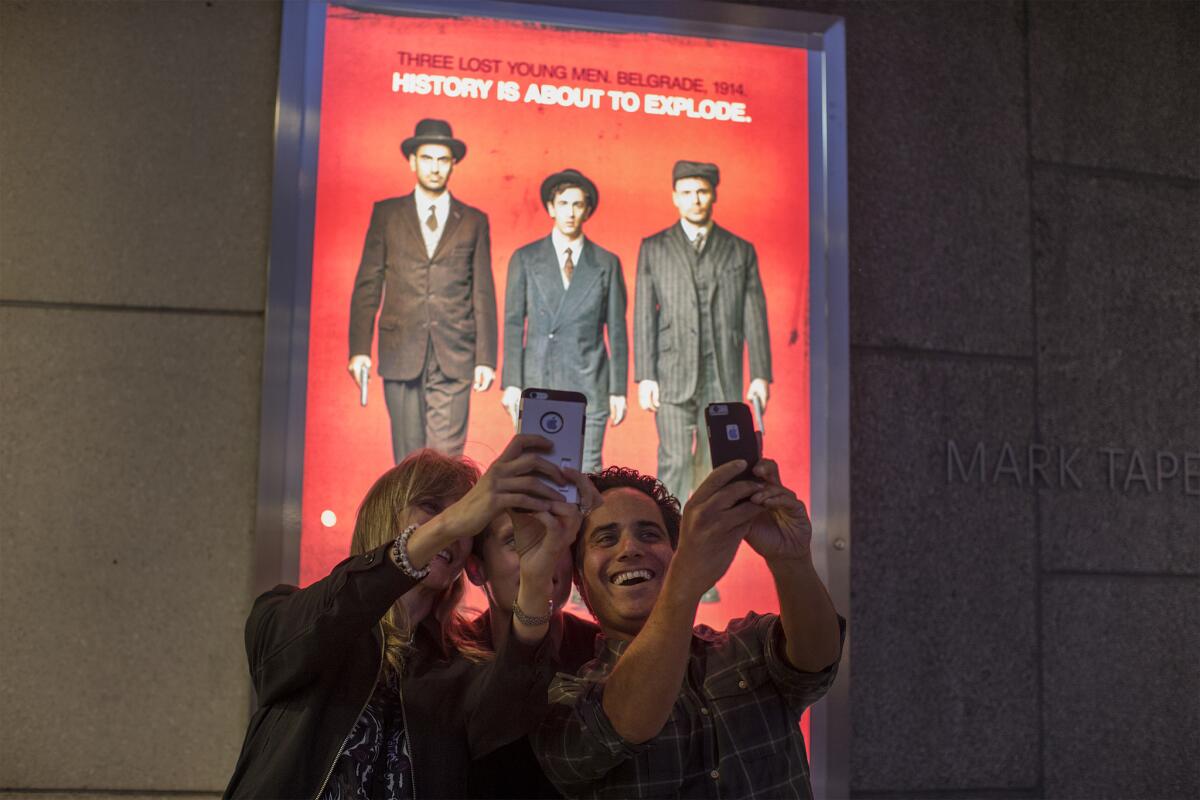
8:03 p.m.
As the house lights dim ...
Joseph reaches behind him to grip Sardelli’s hand.
8:10-9:30 p.m.
Does the rewrite work?
When the rewritten first scene gets laughs, Joseph and Sardelli high-five. Joseph proves an active audience member, laughing at the pratfalls and mouthing the mad, seductive speeches of Black Hand leader Dragutin “Apis” Dimitrijevic along with actor Patrick Page. Every once in a while, he scribbles a few words in his notebook.
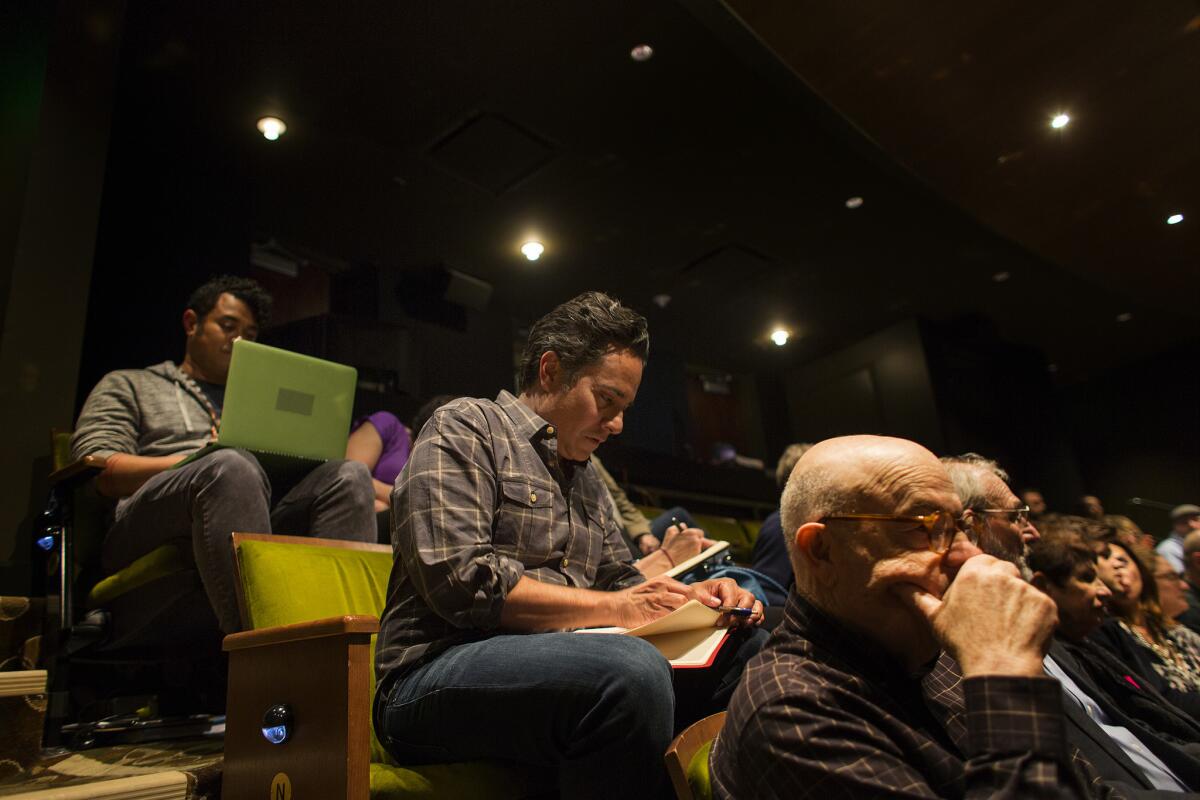
9:30 p.m
‘At least we know it works’
The house lights come up, signaling intermission. Joseph looks radiant. “I think it’s going pretty well,” he says. He turns to Sardelli, who is also smiling. “We have a lot to do, but at least we know it works,” she says. “The tone — the mixture of comedy and tragedy — that’s coming across.”
“The first scene is better,” Joseph says.
“Because people have a chance to laugh before they hear ‘tuberculosis,’” agrees Sardelli. “You should have heard the actors earlier today with the new lines. ‘I don’t get it.’ I was like, ‘Just say the words. He’s the writer. He knows what he’s doing.’”
“Could you hear Michael Ritchie laughing?” adds Lindsay Allbaugh, one of CTG’s associate producers. “That’s big. He never laughs.”
9:40 p.m.
Intermission
Joseph is scheduled to give The Times a quick video interview during intermission, but he momentarily eludes his reporter shadow and darts down to the lobby, where he is engulfed by well-wishers. Stevens and Apted praise the first act as brilliant. Joseph’s former writing instructor has materialized; they make plans to get a drink afterward. The reporter reminds Joseph of the video interview, which he finishes agreeably, and then it’s time to go back into the theater.
9:45 p.m.
The night’s unexpected star
The Act 2 set, by designer Tim Mackabee, comes as a complete surprise to the audience. Where did it even come from? It’s gorgeous. It moves. It gets its own round of applause.
10:25 p.m.
Thumbs up? Thumbs down?
The house rises to give the curtain call a standing ovation. Some people are wiping tears. “Wonderful,” people in the row in front of Joseph turn to tell him as they file out. He glows. Sardelli, Joseph, the stage manager and the designers still have to go over notes from the night, but they agree to run backstage to congratulate the actors first.
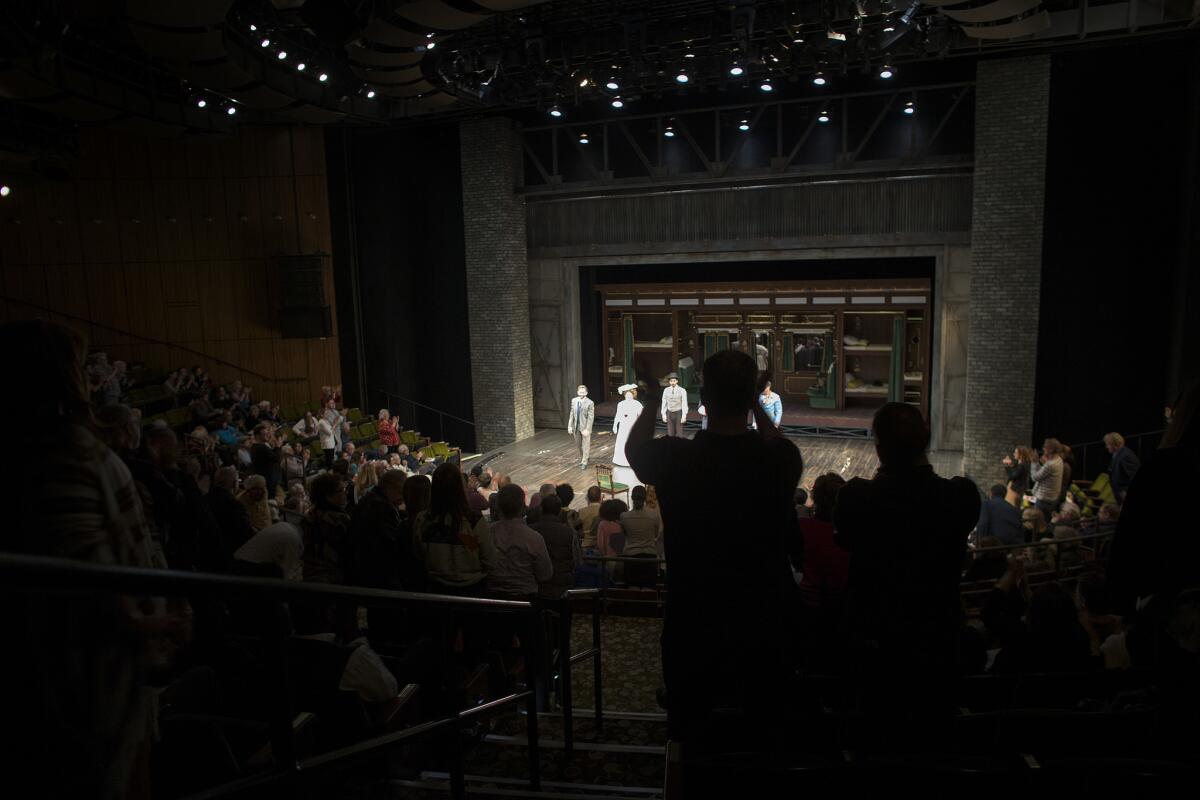
Just as they’re mobilizing, a striking young woman with long, fair hair approaches Joseph. “I’m Serbian,” she announces. She gestures at the two young women beside her. “We are all Serbs.”
“Nice to meet you,” says Joseph affably.
But it’s not entirely a social call: The woman expresses concern that people will take Joseph’s fictionalized version of Serbian history as fact.
“I put my own spin on it, but I hope that people who are curious will go back home and do their own research into these events,” Joseph replies with a smile.
“Does anybody ever go home after a play and do research?” asks the woman with a touch of hostility, crossing her arms.
Sardelli taps Joseph on the shoulder. “I hate to steal you, but we have to go see the actors now or else we’ll lose them.”
Joseph thanks the women for coming.
10:30 p.m.
The work’s not over
Joseph and the designers take a winding route from the second-floor lobby down to the dressing rooms. The actors are already emerging into the hall, which becomes a blizzard of leather jackets and cross-body shoulder bags. Page produces a small dog from his bag and presents it to Ritchie to kiss.
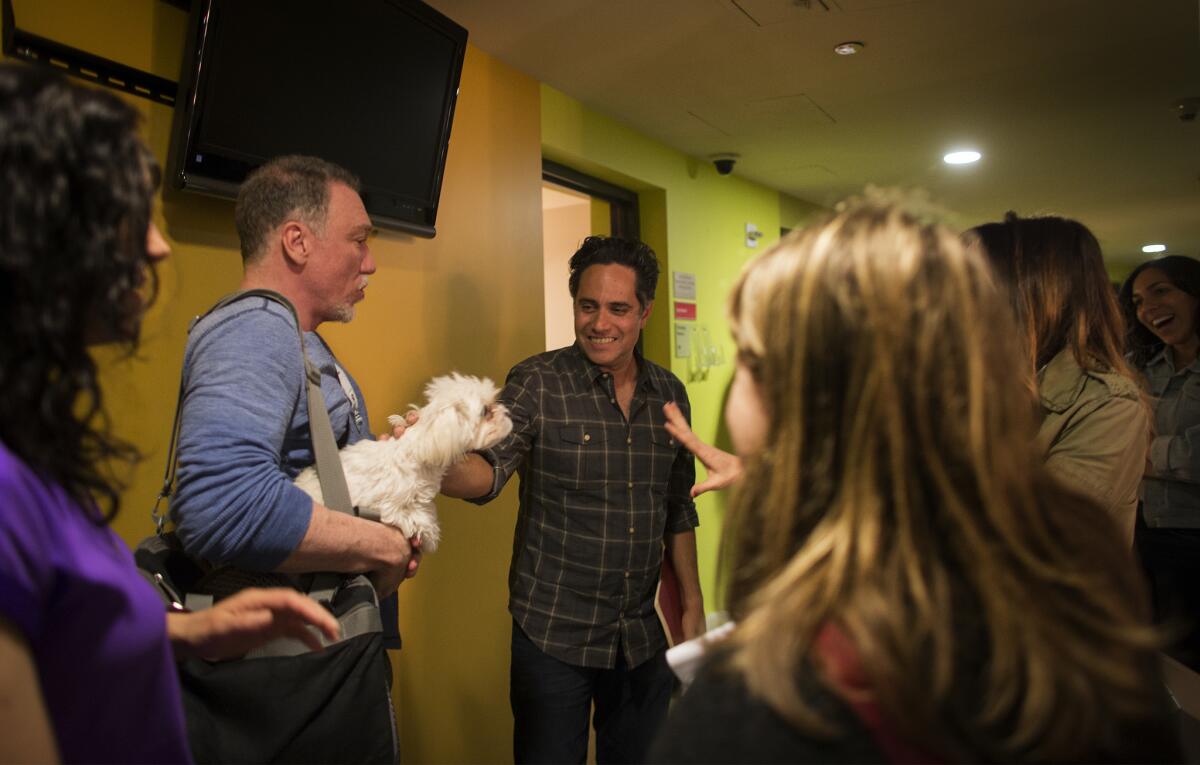
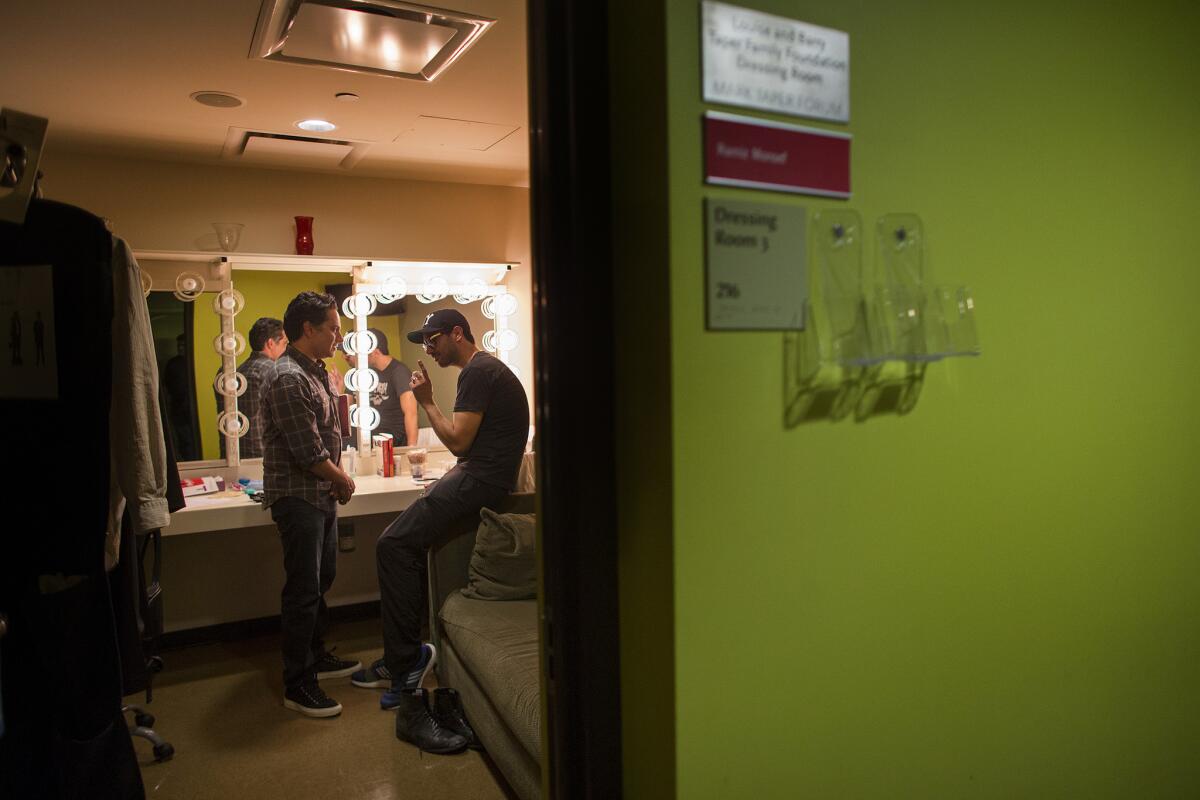
Amid the chaos, a stagehand bursts out from one of the rooms with a grim expression and a laundry basket full of bloodstained garments, closing the door sharply behind her. Ten minutes later, the door opens again, and Joanne McGee, who plays Apis’ dour, cat-hating servant, Sladjana, emerges smiling and free of gore.
The team eventually reunites in the now-empty house for tech notes. Associate production manager Kate Coltun conducts the meeting briskly, requesting comments about set, lights, sound, props and costumes. The set crew plans to work the following day on the “judder” in the moving set, taking it apart and oiling the runners. The props team is asked to intensify the blood spatters that decorate various handkerchiefs and garments throughout the show. Somebody suggests dampening the cloth so that the fake blood will “wick” into it more quickly.
11 p.m.
One night down, and ...
After the next day’s call times are set, the meeting ends. The reporter, whose brief sojourn as a shadow in this Platonic cave is over, heads home. The others head out for drinks.
♦ ♦ ♦ ♦ ♦ ♦ ♦ ♦ ♦
‘Archduke’
Where: Mark Taper Forum, 135 N. Grand Ave., L.A.
When: Through June 4
Tickets: $25-$95 (subject to change)
Info: (213) 628-2772, www.CenterTheatreGroup.org
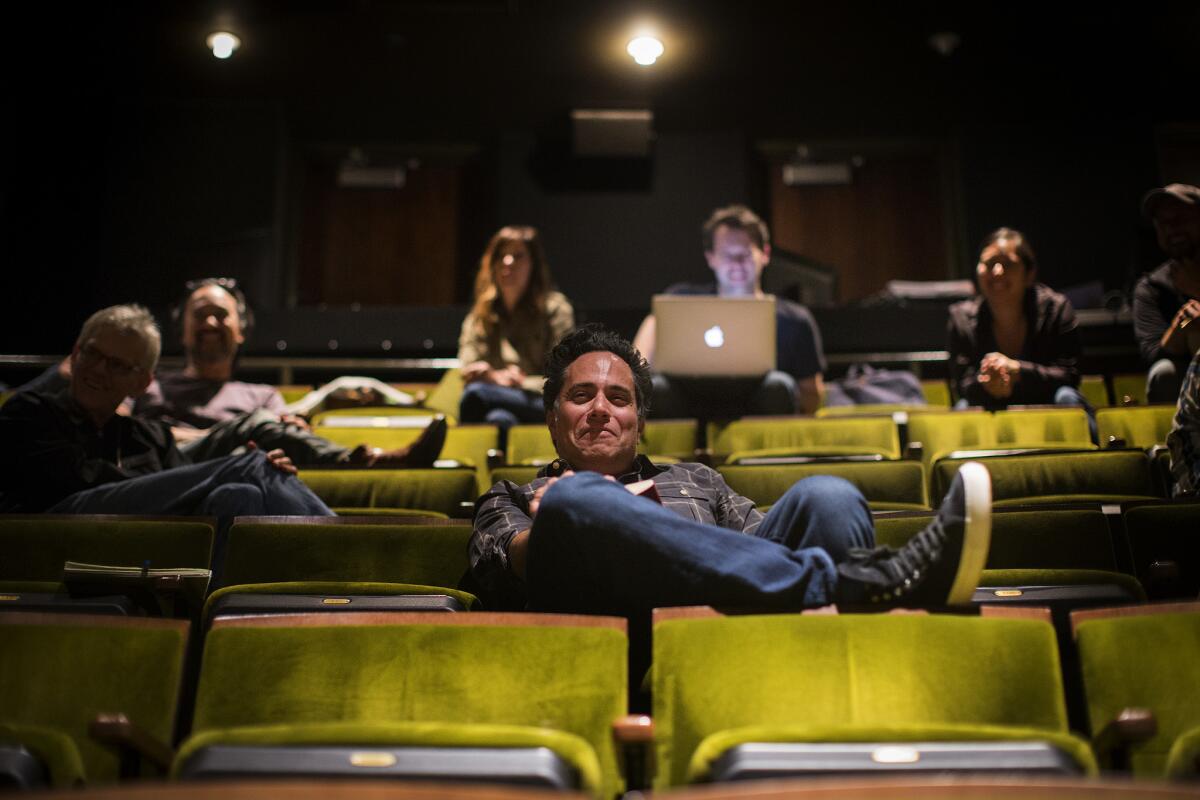
UPDATES:
For the Record
An earlier version of this article erroneously said stage manager Michelle Blair ran the tech-notes meeting at the end of the night. Associate production manager Kate Coltun ran the meeting.
The biggest entertainment stories
Get our big stories about Hollywood, film, television, music, arts, culture and more right in your inbox as soon as they publish.
You may occasionally receive promotional content from the Los Angeles Times.







